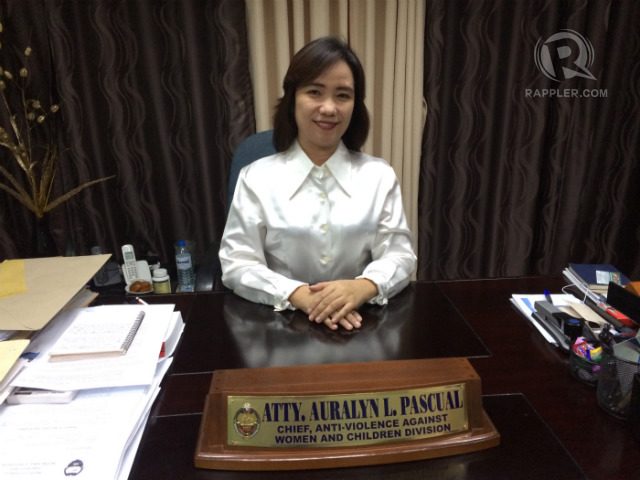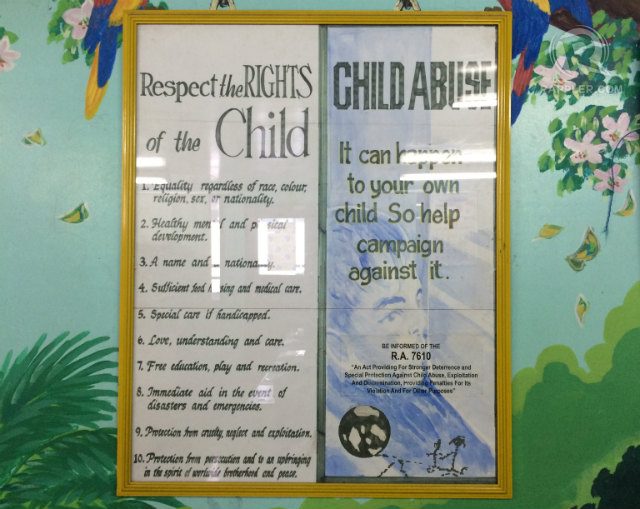SUMMARY
This is AI generated summarization, which may have errors. For context, always refer to the full article.

MANILA, Philippines – At the central building of the National Bureau of Investigation (NBI), the country’s premiere investigative agency, portraits of past NBI directors are carefully lined up on the wall.
A few steps away and you’ll see the framed photos of current NBI Director Virgilio Mendez, Justice Secretary Leila de Lima, and President Benigno Aquino III.
In that short walk along the bureau’s lobby, there is only a single portrait of a female – the feisty justice secretary herself.
A line agency attached to the Department of Justice, the NBI is an institution not lacking in display of machismo. As all of its past directors and current deputy directors are male, the NBI seems to be a fraternity of sorts.
As of May 2014, NBI data show that only 11% of the bureau’s agents and special investigators are female. One has to be a law degree holder or a certified public accountant to become an NBI agent, while a college degree is required of an NBI special investigator.

Lawyer Auralyn Pascual, head of the NBI Anti-Violence Against Women and Children Division (VAWCD), said the bureau’s current male-female ratio is already a huge development compared to the time she started as an agent in 1992.
Pascual is the first female superintendent of the NBI Academy, where applicants to the bureau are trained either to become agents or special investigators. She is also the only female division head in the NBI special investigation services.
Trained as a co-equal
Pascual just got married and had her first baby a year before she joined the ranks in 1992. “Fresh mother, fresh wife,” she described herself at the time she entered the bureau.
But Pascual said women in the NBI are trained as co-equals of their male counterparts, undergoing the same battery of tests and judged by the same standards required of an agent or a special investigator.
There are of course challenges that are exclusive to the female gender. Dealing with certain physical limitations following a pregnancy was “one thing that was really challenging,” Pascual said.
“Kapag may mga (When there were) raids during that time – and it was frequent – I had to go back to our house to breastfeed the baby,” Pascual recalled.
Now with the NBI for 22 years, Pascual is blessed with 5 kids. “I got them all out in 7 years,” she said, smiling.
Make no mistake, Pascual was quick to warn, as she and all other lady agents are trained in martial arts and are prepared for the occasional gun fights that come with the job. “You don’t expect to be treated as a queen. You all do the assault….Some criminals would resist arrest,” she said.

Emotion-laden cases
As current chief of the NBI VAWCD, Pascual leads a team of investigators and agents handling cases of violence against women and children.
The VAWCD office is easy to remember, with its green walls painted with Disney characters in a garden setting. Its playful and attractive interior contrasts with the stories relayed within the office’s 4 walls, as the division often caters to a host of sobbing women.
Pascual said the cases handled by her division – currently composed of 3 male agents and 3 female agents – are almost always emotionally draining.
Pro-women and -children lawyer June Ambrosio explained that domestic violence and child abuse cases require a certain level of emotional input from assisting lawyers. Continuity of care, which includes making sure the victims are coping with trauma even after perpetrators have been charged, is often expected.
Ambrosio added, however, that an assisting lawyer should not let her emotions manipulate her or blur her perspective of the case. Ambrosio is the head of the Integrated Bar of the Philippines (IBP) National Center for Legal Aid (NCLA).
“You have to be able to stand back. You have to be able to be objective,” she said.
Inside her green-walled office, Pascual is a multi-tasking machine, one moment verbally relaying updates needed in the documents her trainee is transcribing, the next moment making sure statements of victims seeking help from her office have already been taken by her agents.
Idle time is a rarity for Pascual. She shows very little emotion and knows that is part of her job. “You interact with the victims, but you have to hold yourself,” she said of the cases her division is handling.

Women helping women
Mary Antoniette Calimag, one of 3 female agents under Pascual, admits her work to be emotion-laden but sees herself working nowhere but at the NBI VAWCD.
Seeing her job as more of a mandate to be fulfilled than a means to generate income, Calimag said she remembers by heart every case that she has ever handled in her 6 years with the NBI.
Eager to talk about the work NBI VAWCD does, Calimag feels she is exactly where she has to be.
“I tried private practice, but it doesn’t give me that sense of fulfillment na hinahanap ko (that I’m looking for),” she said, adding that her short stint as a practicing lawyer mostly involved pro bono cases anyway – to the frustration of her mother.
“Madalas nga ako lokohin ng nanay ko, ‘Anak, ‘yung thank you, hindi naman puwede pangbili sa palengke.’ Kasi marami ako noon, pro bono cases. Ultimo yung aking notary public, marami doon thank you,” she recalled, suppressing laughter.
(I was often teased by my mother, “My child, ‘thank you’ can’t be used to buy anything from the market.” I had a lot of pro bono cases then. Even my services as notary public were mostly paid with just a “thank you.”)
Married for almost two years, Calimag started at the NBI Legal Division before being assigned to VAWCD. Cases handled and assistance provided by the bureau to other government agencies and civilian complainants are free of charge.
Tasked with case build-up needed to recommend preliminary investigation and eventual prosecution, NBI agents don’t always see suspected criminals convicted in court, in relation to the cases they helped investigate.
“Actually, nalulungkot ako. Pero it doesn’t stop me from doing my work. Instead, tinitingnan ko yung anggulong kulang,” she said of the cases she handled that didn’t end in a conviction. (It saddens me. But it doesn’t stop me from doing my work. Instead, I strive to identify what angles I missed.)

Sense of fulfillment
As a young agent, one of the high-profile cases NBI VAWCD head Pascual handled was the kidnapping of Cory Quirino. Pascual recorded in writing Quirino’s narrative of the abduction.
Even prior to being the head of VAWCD, Pascual has worked extensively on other criminal cases including robbery, illegal possession of firearms, and drug trafficking.
More than her collection of awards over the years, Pascual said it is the pursuit of justice that keeps her going.
“There are really cases that are hard to crack, and it’s really fulfilling when you see the perpetrators go to jail,” Pascual said, adding that she also draws strength from her comrades at the bureau, both male and female.
As for the younger Calimag, she said gender was never an issue for her. It was always about what the bureau as an institution can do for the nation.
“Basta ever since ‘yung philosophy ko: ‘Yung nagagawa ng lalake, nagagawa din ng babae….Gender ko doesn’t affect my work. Sa akin, hindi siya issue. We complement. Kasi di kayo puwedeng magpagalingan. Kailangan magcomplement kayo, para makapaglingkod sa bayan,” she said.
(Ever since, my philosophy has been: Whatever a man can do, a woman can do too…. My gender does not affect my work. For me, that’s not an issue. We complement [each other]. Because it shouldn’t be a competition. You need to complement each other, so you can serve the nation.) – Rappler.com
Add a comment
How does this make you feel?





There are no comments yet. Add your comment to start the conversation.